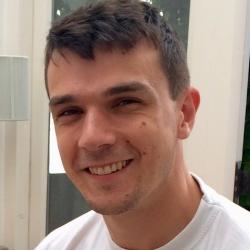Job Titles

Department of Archaeology
I studied Archaeology and Anthropology at the University of Cambridge (2008-2011) and then did an MSc in Cognitive and Evolutionary Anthropology at the University of Oxford (2011-12). I then completed my PhD in Anthropology at University College London (2013-16) with a thesis entitiled 'The behavioural ecology and evolutionary implications of hunter-gatherer social organisation'. Following my PhD, I was a Research Fellow at the Institute for Advanced Study in Toulouse (2016-17). I was then a Junior Research Fellow at Jesus College, Cambridge (2017-19). During this time, I worked in the Department of Zoology, collaborating with Prof Tim Clutton-Brock to consider the causes and consequences of variation in social behaviour across mammal societies. I was then a Lecturer in Quantitative Anthropology at UCL for four years (2019-2023). I joined the Department of Archaeology as an Assistant Professor in July 2023. I am an Associate Editor at Proceedings B and a Fellow of King's College, where I am also Director of Studies for Archaeology and Deputy Research Director.
I am an evolutionary anthropologist with broad interests in understanding both human evolution and variation in behaviour and biology across human populations. I am also interested in understanding the causes and consequences of variation in social organisation and social behaviour across mammals more generally.
My empirical research has involved quantitative ethnographic fieldwork with Agta foraging communities in the Philippines and with fishing communities in the Brazilian Pantanal. I have also worked on the social behaviour of meerkats in the Kalahari. Specific empirical questions I have worked on include:
In my theoretical work, I use computational and mathematical models to explore questions such as:
I am open to enquires from prospective MPhil and PhD students.
Dyble, M., Salali, G.D., Chaudhary, N., Page, A., Smith, D., Thompson, J., Vinicius, L., Mace, R. and Migliano, A.B., 2015. Sex equality can explain the unique social structure of hunter-gatherer bands. Science, 348(6236), pp.796-798.
Dyble, M., Thompson, J., Smith, D., Salali, G.D., Chaudhary, N., Page, A.E., Vinicuis, L., Mace, R. and Migliano, A.B., 2016. Networks of food sharing reveal the functional significance of multilevel sociality in two hunter-gatherer groups. Current Biology, 26(15), pp.2017-2021.
Dyble, M., Houslay, T.M., Manser, M.B. and Clutton-Brock, T., 2019. Intergroup aggression in meerkats. Proceedings of the Royal Society B, 286(1917), p.20191993.
Dyble, M., Thorley, J., Page, A.E., Smith, D. and Migliano, A.B., 2019. Engagement in agricultural work is associated with reduced leisure time among Agta hunter-gatherers. Nature human behaviour, 3(8), pp.792-796.
Dyble, M., 2021. The evolution of altruism through war is highly sensitive to population structure and to civilian and fighter mortality. Proceedings of the National Academy of Sciences, 118(11), p.e2011142118.
Dyble, M., Gardner, A., Vinicius, L. and Migliano, A.B., 2018. Inclusive fitness for in-laws. Biology Letters, 14(10), p.20180515.
For full publication list, see my GoogleScholar
I lecture and supervise on the following papers:
NST Pat IA Evolution & Behaviour
B1: Humans in biological perspective
B2: Human ecology and behaviour
B4: Comparative human biology
B13: Evolutionary medicine
My current doctoral students are:
Sarah Erskine: The Use of Theoretical Models in Evolutionary Anthropology: Limits and Opportunities
Sara Sherbaji: Is Causal Understanding Necessary for Cumulative Technological Culture?
George Brill: A Natural History of Human Locomotor Versatility: Patterns and determinants of variability in hunter-gatherer locomotor performance.

Postal Address:
Department of Archaeology
Downing Street
CB2 3DZ Cambridge
Information provided by:



© 2024 University of Cambridge